
Mac Support

iPod Support

iPhone Support

iPad Support

ScreenCast Online
Learn all about the new features introduced with Mountain Lion and iCloud as well as regular up to date tutorials all about the Mac and OSX. In addition, we have tutorials on some of Apple's leading applications including iLife, iWork, Aperture, iBooks Author and more...ScreenCastsOnline
OS X 10.5 to 10.8 Upgrade
Mountain Lion (OS X 10.8) is available from the Mac App Store for just $20. Unfortunately, installing Mountain Lion requires that you already have a Mac running Snow Leopard (OS X 10.6) or Lion (OS X 10.7). If you're currently running a Leopard system, you're out of luck, and need to pay $29 to upgrade to Snow Leopard, and then an additional $20 to upgrade again to Mountain Lion.
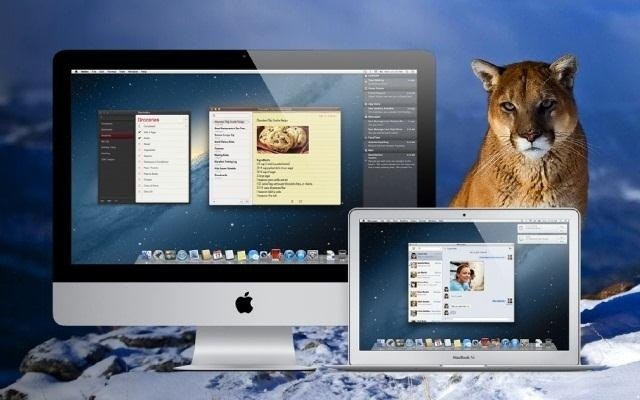
That sounds like way to much trouble to me. But why exactly is Leopard incompatible? Turns out it's not—mostly anyways. The one actual compatibility issue is that Mountain Lion is only available in the Mac App Store, which is available in Snow Leopard onwards.
However, if you have an alternate machine to make the purchase on, or you have put Mountain Lion on a flash drive or DVD, there's actually no technical reason why Mountain Lion wouldn't work. One way to get this to work is to do a clean install of your Mac, backing up all of your files first, then transferring them over once you've installed the new OS. However, some came up with a much quicker and easier method to "tricking" your Mac into thinking it already has Snow Leopard installed. However, it does involve editing a .plist file, so if you're a bit squeamish about going into your OS's insides, this might not be the method for you.
1. Navigate to Core Services
Navigate to the /System/Library/CoreServices folder. 2. Edit SystemVersion.Plist
Using a text editor that lets you edit system-level files, open SystemVersion.plist. Locate the line with the ProductVersion key. Just below it is a string of characters indicating what OS you are running. Your number might look something like 10.5.8, signifying you are running OS X 10.5.8. Change that number to 10.6.8, then save the file. 3. Restart Your Mac
Lastly, shut down your Mac and restart it. You'll need to boot from a drive running Snow Leopard or later, such as the bootable Mountain Lion drive I mentioned earlier.
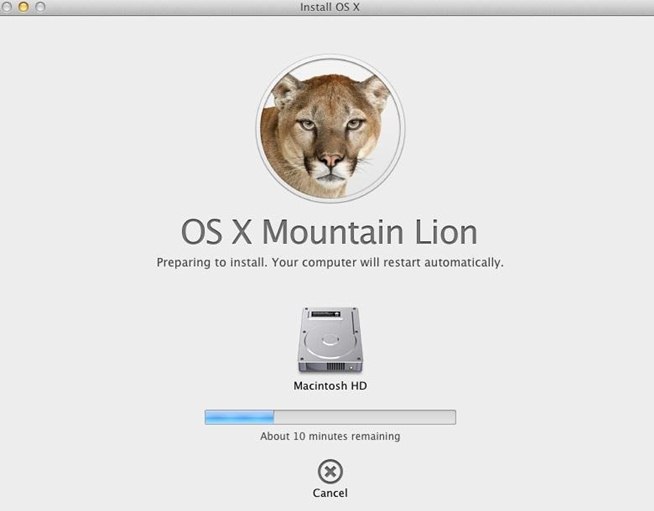
When the OS X Utilities screen comes up, select Reinstall OS X to install Mountain Lion over your Leopard drive.

That sounds like way to much trouble to me. But why exactly is Leopard incompatible? Turns out it's not—mostly anyways. The one actual compatibility issue is that Mountain Lion is only available in the Mac App Store, which is available in Snow Leopard onwards.
However, if you have an alternate machine to make the purchase on, or you have put Mountain Lion on a flash drive or DVD, there's actually no technical reason why Mountain Lion wouldn't work. One way to get this to work is to do a clean install of your Mac, backing up all of your files first, then transferring them over once you've installed the new OS. However, some came up with a much quicker and easier method to "tricking" your Mac into thinking it already has Snow Leopard installed. However, it does involve editing a .plist file, so if you're a bit squeamish about going into your OS's insides, this might not be the method for you.
1. Navigate to Core Services
Using a text editor that lets you edit system-level files, open SystemVersion.plist. Locate the line with the ProductVersion key. Just below it is a string of characters indicating what OS you are running. Your number might look something like 10.5.8, signifying you are running OS X 10.5.8. Change that number to 10.6.8, then save the file.
Lastly, shut down your Mac and restart it. You'll need to boot from a drive running Snow Leopard or later, such as the bootable Mountain Lion drive I mentioned earlier.

System Configuration
Software Update
CertificatesSSL communications are authenticated with the help of certificates for Internet applications such as Mail and Safari. The first time your computer is communicating with a third party, it receives a certificate that will prove its authenticity. Usually, the process consists in accepting the certificate for further communications so that the computer will automatically check the authenticity of the third party compared to its previous sent certificate. This protects the computing from fishing attack. When an unknown certificate is received, such a window appears:

Then to install the certificate for ever, do the following steps:
- Do a Software Update in the Apple Menu
- Install all the suggested softwares
- Restart the computer if needed, and come back to Step 1 while there is a new software to install
- X11 environment is now installed by default with Leopard
- If you want to a programming environment, the installation of XCode might be useful from the installation DVD of Leopard
- Proceed to a Software Update as in the first paragraph
- In the Apple Menu, select System Preferences
- Go to Security
- In General, proceed to the following seetings

- In Firewall, proceed to the following settings in Firewall Options, where the list of the applications might differ depending on your configuration. This list is automatically updated by popup window, when an new application is asking for an incoming connections.

- I consider this Firewall settings enought, therefore I personally do not use any other antivirus software such as Norton
- Go back to all the preferences by selecting Show All
- In order to update your system automatically, go to Software Update, and select all the possible options as

- Install a shortcut in the Dock. The Terminal application is the folder Utilities, which is itself in the folder Applications. To create the shortcut, move the Terminal icon inside the Dock. Terminal is just an xterm but under the Mac environment
- Do the same with the X11 application which is in the same place. X11 is a fully X terminal. It can be used in order to launch applications located in a X server.
- Clean the Dock by removing all the unnecessary applications.
- The .ssh folder. In your home directory, using Terminal create a folder .ssh if it does not exist
- Under X11, it is possible to condifure ssh the distant opened windows will be open on the Mac. This is very useful for running distant applications such Matlab, Mapple... For this, inside folder .ssh, create a file config with the following content: FallBackToRsh = no ForwardAgent = yes ForwardX11 = yes
- You can also setup a default remote login different from yout Mac login as follows User = login where login is your default remote login
- To log in using a private/public key, for not entering your password anymore, you need to create a secret and a public key using the Terminal command ssh-keygen -t dsa. The public key file id_dsa.pub need to be copied to the remote .ssh folder, under the name authorized_keys, where has the private key file id_dsa should be in your Mac .ssh folder.
CertificatesSSL communications are authenticated with the help of certificates for Internet applications such as Mail and Safari. The first time your computer is communicating with a third party, it receives a certificate that will prove its authenticity. Usually, the process consists in accepting the certificate for further communications so that the computer will automatically check the authenticity of the third party compared to its previous sent certificate. This protects the computing from fishing attack. When an unknown certificate is received, such a window appears:

Then to install the certificate for ever, do the following steps:
- Click on Show Certificate
- Click the option Always trust... as below

- Click on Connect
- First try the simplest method that might work. When a print job is launched, select a printer from the Printer menu in the category Nearby Printers.
- Other possibility: install a printer via IP when the printer is on the network but was not detected by the previous method (or there is a fonts issue)
- Go to System Preferences in Apple menu
- Select Print & Fax, and click on the + button
- Select IP and fill the options as below:

- Note: the printer might be only reachable from the local network, and therefore not with external wifi networks
Remote Folder and Synchronization
Dropbox
One favorite solution comes from a third party application. Dropbox provides 2GB free storage that is automitacally synchronized among all your computers and on remote servers of Dropbox. This safe, fast and robust. By using the above link, you will get an extra 500MB of free storage. For even more free storage, link your dropbox to your twitter/facebook account. One drawback is that your files are copied on Dropbox servers. If that bothers you, simply encrypt sensible datas or don't synchronize those with Dropbox.
SSH Mount
The package sshfs lets you mount a remote volume from anywhere through assh access. Together with the front engine osxfuse (previously known as Macfuse), it provides a very convenient solution that works both from office and home.
Synchronization
A remote folder can be synchronized to a local one using rsync command.
One favorite solution comes from a third party application. Dropbox provides 2GB free storage that is automitacally synchronized among all your computers and on remote servers of Dropbox. This safe, fast and robust. By using the above link, you will get an extra 500MB of free storage. For even more free storage, link your dropbox to your twitter/facebook account. One drawback is that your files are copied on Dropbox servers. If that bothers you, simply encrypt sensible datas or don't synchronize those with Dropbox.
SSH Mount
The package sshfs lets you mount a remote volume from anywhere through assh access. Together with the front engine osxfuse (previously known as Macfuse), it provides a very convenient solution that works both from office and home.
- Install both oxfuse and sshfs from the webpage FUSE for OS X.
- In order to mount the remote volume, write into a terminal:
Synchronization
A remote folder can be synchronized to a local one using rsync command.
- To backup a remote folder: rsync -auz -vv -e ssh login@remote_address:remote_folder local_folder
- To export a local folder: rsync -auz -vv -e ssh local_folder login@remote_address:remote_folder
- One can also exlude some file by adding --exclude "pattern" between the source and the destination
Which Mac is Worth Your Investment?
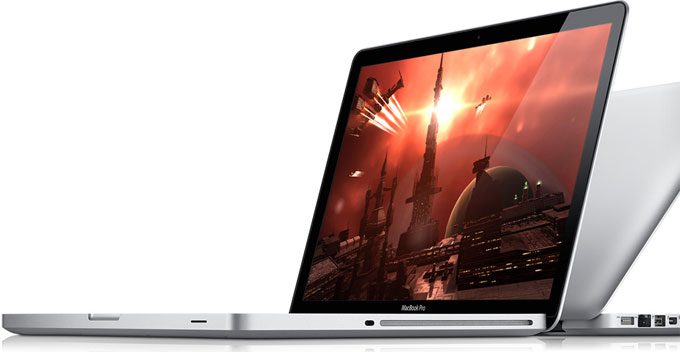
Everything about the Mac notebook line is out of the ordinary. Its simple yet sophisticated design does not compromise its performance due to the fast processors and generous memory built in it. And when it comes to variety, the Mac notebook line has more than enough to meet any kind of preference. Every member of the Mac notebook family is individually equipped with their own set of features and specifications to offer something different to a wide range of users. The MacBook Pro and the MacBook Air, however, are two of the most reliable notebooks that can operate like a full–featured desktop computer. So if you're thinking of getting a Mac notebook, your first step is to identify which model best suit your needs. Here are some important points to help you know which Mac notebook is worth your investment. |
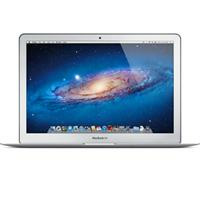 Fast, Efficient Processors Like No OtherProfessionals dealing with urgent, demanding tasks will find all Mac notebooks their reliable work companions. No matter how intense the duties are, Mac notebooks can meet any kind and amount of demands as they are equipped with top-of-the-line Intel processors. The MacBook Pro, the fastest Mac notebook, runs up to 2.7GHz with an Intel Core i7 processor; while the MacBook Air has more than enough power to get your job done with its 1.6GHz and 1.8GHz configurations despite its size. |
Generous Memory Capacity
What makes Mac notebooks ideal for professionals is their generous memory capacity. This allows Mac notebooks to become perfect choices for professionals who need to keep heavy document files. Both the MacBook Pro and the MacBook Air can support up to 4 MB of RAM.

Better Visual Experience
Clear, panoramic, and glossy, the displays of all Mac notebooks come with LED-backlit widescreen format, giving users a more refined visual experience that is comfortable to the eyes. The MacBook Pro offers a larger screen size with its 13-inch, 15.4-inch, and 17-inch models and resolutions of 1280 x 800, 1440 x 900, and 1920 x 1200 pixels. On the other hand, the MacBook Air has 1330 x 768 pixels in 11.6-inch display and 1440 x 900 in 13.3-inch screen size.
Also, both notebooks are equipped with the Intel HD Graphics 3000 processor, giving no trouble and better visual experience as you watch movies and author multimedia content, or play video games.
The Convenience of Portability
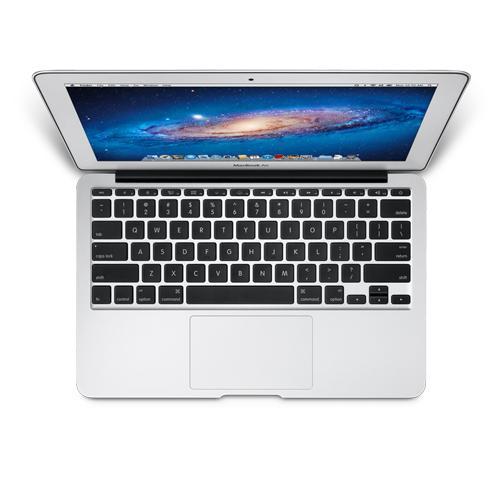
The MacBook Air and the MacBook Pro differ in their physical dimensions with varying degrees of portability so consider how much mileage you can expect on your notebook.
If you are a business traveler who is always shuffling from one flight connection to the next, then the incredibly light and compact MacBook Air is the perfect choice for you. For half a pound to two pounds more, you can have all the power and larger display of the MacBook Pro.
Fit For Your Budget
The MacBook Air has a very reasonable price that starts at $999 only. It also has all the features you need in one compact, robust package. But if you want more than a MacBook Air can offer, the MacBook Pro, which price starts at $1199, is the perfect choice for you.
Everything will eventually come down to how much your budget can accommodate. Identify your needs and choose the notebook that can best provide them. Whichever Mac notebook model you end up with, it will surely be a worthy investment.
Subscribe to:
Comments (Atom)
Tip of the Day
News
Mac Tips and Tricks
Games
★
★★★★★
⌘
Tips+Tricks
MacTips
WebApps
Tips + Tricks
Widgets
Downloads
iPhoto
Safari
Tips
Apple
Free Apps
Personal
GarageBand
iMovie
Internet
Utilities
Multimedia
Apple Downloads
Pro Tip
iWeb
Dashboard
iTunes
Mac
Dashcode
iDVD
DashboardClocks
Support
10.8
Applications
iLife News
OSX
Tutorials
10.7
Desktop
Mac Tip of the Day
AppleTV
Dashboard Widgets
Finder
Firefox
MacWidgets
OS X Mountain Lion
Tips and Tricks
TopApps
Videos
10.6
Keyboard Shortcuts
iPad
iPhone
Mac
10.9
AirPlay
Apps on Mac
Dock
Just Added
Mac App Store
MacApps
MacNN
OS X
OS X Lion
Softpedia
Tricks
Updates
iCal
iLife
iLife Widgets
iPhone Tips and Tricks
FAQ
Mail
AppShopper.com
AppleNews
Application Tips
Customizing
Customizing Your Mac
Dashboard Guidelines
Developer Widgets
Exposé
Games Widgets
Mac App Store - News
Mac OS X 10.6
Mac OS X 10.8 Mountain Lion
Mac101
MacNews
MacUpdate
Mac|Life
OS X Daily
Preview
Snow Leopard Tips
Terminal
TextEdit
Top10 Mac Tips
VersionTracker
Video Tutorials
Windows
iCloud
iLife 11
iWork
Navigation
Key Combos
Mac 101
MacSupport
OS X 10.8 Mountain Lion
OS X Mavericks
Search Widgets
Security
iDVD Widgets
iPod
10 Keyboard Shortcuts for Text
9 to 5 Mac
A
A-Z Glossery - iPhone App
ATMac
Address Book
App
App Store - News
AppShopper
Apple Gazette
Apple Keynotes
Apple Matters
Apple Pro
Apple Support Tips
Apple Updates
AppleInsider
Applelinks
Apps A-Z
Apps Apps Apps
Apps on Mac - Dashboard Widget
Asteroid
Audio
Automator
B
BindApple
Blogs + Forums Widgets
Business Widgets
C
Calculate + Convert
Changing the background
Check external devices
Check spelling and grammar
Clear Versions History + Auto-Save Cache Data
Cult of Mac
Cydia
D
Daily Tips and Tricks
Dashboard - Tips+Tricks
Dashboard Tips and Tricks
Dashboard Widget
DashboardCandy
DashboardSearch
DashboardWidgets.com
Desktop Computers
Developer Forum
Developer News
Developer Tips
Development Tools
Disable restored windows when re-opening specific apps
Discussions
Display a login banner
Display a short message
Display system stats
Dual Boot OS X 10.7 Lion + OS X 10.8 Mountain Lion
E
Easy Mac Tips
Email + Messaging Widgets
Essential
Expose
Extract and Save Mac Application Icons
F
Find a MAC Address in Mac OS X
Find iMessage Users + Contacts
Folders
Food Widgets
Freeware
G
Get iTunes track notifications in your Dock
Get quick information with widgets
Google News
H
Hackint0sh
Hacks
Hongkiat
How To
How to disable the Java web plug-in
I
IT Industry Today
Icons
Icons + Screensavers
Image Capture
Information Widgets
InsanelyMac
Installation
International Widgets
J
Just Added - iPhone Apps
Just Added Downloads
Just For Fun Widgets
K
Keynote Address
L
Launchpad for Mac OS X Snow Leopard
Links
Lion
M
Mac App Store - Business
Mac App Store - Developer Tools
Mac App Store - Education
Mac App Store - Entertainment
Mac App Store - Finance
Mac App Store - Games
Mac App Store - Graphics + Design
Mac App Store - Health + Fitness
Mac App Store - Lifestyle
Mac App Store - Medical
Mac App Store - Music
Mac App Store - Photography
Mac App Store - Productivity
Mac App Store - Reference
Mac App Store - Social Networking
Mac App Store - Sports
Mac App Store - Top 50 Mac Apps
Mac App Store - Travel
Mac App Store - Utilities
Mac App Store - Video
Mac App Store - Weather
Mac Developer Tips
Mac OS X
Mac OS X 10.7 Lion
Mac OS X Applications
Mac OS X Things
Mac OS X Tips
Mac OS X Tips - News
Mac OSX Hints
Mac OSX Hints - News
Mac Quick Tips
Mac Tips
Mac Tips Daily
Mac Tips and Tricks - Desktop App
Mac Tips and Tricks - Mac OS X Dashboard Widget
Mac360
MacApp
MacApper
MacFixIt
MacLion
MacMusic
MacOSXAudio.com
MacRumors
MacTech
MacUpdate.com
MacintoshOS.com
Maciverse
Macworld.com - iPhone App Reviews
ManiacDev
MobileMe News
ModMyi.com
Most Recent
Movies + TV Widgets
Music Widgets
N
Navigating + Selecting Text in Mac OS X
Networking + Security Widgets
New Application Tips
New iPhone Apps
News Widgets
News on Mac
Notification Center
O
OS X - FAQ
OS X 10.7
OS X Basics
OS X Mac Tips + Tricks
OS X Mountain Lion - News
OS X Snow Leopard
OSX Basics
Open source
OpenDashboard
P
Pages
Podcast Widgets
Portable Computers
Ports and Connectors
Preferences
Press Release
Q
R
Radio + Podcasts Widgets
Rampant Mac - iPhone Wallpapers
Rename Files and Folders
Restart an external device
S
SD and SDXC card slot FAQ
Safari 5.1
Safari 6
Safari Videos
Scheduled Startup and Shutdown
Set Up Storage Devices
Set up iCloud
Shopping Widgets
Simple Desks
Snow Leopard
Softonic - Mac
Softonic.com
Softpedia - Tips + Tricks
Softpedia.com
Stacks
Staff picks
Status Widgets
Storage
StorePreview
Switch 101
Syncing with iTunes
System Preferences
T
TUAW
The Apple Blog
The Apple Core
The Mac Observer
The Mac Screencast Guy
The MacTips Podcast
TheDashboard
Time Machine
Tools
Top 10 Grossing Apps
Top 25 Grossing Apps
Top 50 Grossing Apps
Top iTunes Tips
Top10 Paid Apps
Top10 Widgets
Top50 Dashboard Widgets
Translates
Transportation
Travel Widgets
U
Updating
Useful iPhone Shortcuts
Using iChat
V
W
Wallpaper
Want More Mac Tips ?
Web Apps
Webcam Widgets
Widget
Work
X
YouTube Videos
Z
ZDNet
apple.stackexchange.com
digg
gSearch - iPhone App
iChat
iClarified
iCloud + MobileMe
iCloud News
iCloud system requirements
iDesign - iPhone Wallpaper
iHackintosh
iLife - iPhoto - iMovie - iWeb - GarageBand - iDVD
iLife Discussions
iLife Discussions - GarageBand
iLife Discussions - iDVD
iLife Discussions - iMovie
iLife Discussions - iPhoto
iLife Discussions - iTunes
iLife Discussions - iWeb
iLife Support
iLife System Requirements
iLife ’09
iMovie Widgets
iOS 4
iOS Developer News
iPad - News
iPhone - News
iPhone 4
iPhone App
iPhone SDK
iPhoto Widgets
iPod - News
iPod News
iPod Tips and Tricks - iPhone App
iPod touch
iTunes - Latest Movie Trailers
iTunes - News
iTunes - Top News
iTunes App Store
iTunes App Store - All New Applications
iTunes Keyboard Shortcuts
iTunes News
iTunes Plus FAQ
macosxtips.co.uk
switchtoamac.com
thinkmac.net
www.freemacware.com
...organise your mac
10 Quick Mac Tips
10.10
101
ASC
Animation Slow-Mo
Aperture
Aperture Glossary
Apple Support Communities
Boot Camp
Bored of your Mac?
Collect RSS feed URLS from Mail
Create Ringtones in iTunes
Customise your desktop + screen saver
Does your Mac qualify for free 10.8 upgrade?
Download
Download YouTube and Other Videos
FTP
FTP with Finder
Finder Tips
Gatekeeper
Get Mac News
Get More Mac and iOS Tips
Get More Mac and iOS Tips...
Get OS X Tips
Get RSS Menu Extension for Safari 6
Get Windows Live Hotmail with Mail
Get Yahoo Mail with Mail
Get a Homepage - Mac OS X Style
Glossary
Google
Hidden Features
Hidden Features in OS X 10.8 Mountain Lion
Hotmail
Install Windows 8 on a Mac
Mac 101 - Get One on One with your Mac...
Mac OS X Dashboard Widget
Mac Support
Mac Tips and Tricks - Learn how to set up
MacBasics
MacHelp
MacVideos
News and Help
Notification Center Tips
OCD Friendly Volume Controls
OS X 10.5 to 10.8 Upgrade
OS X Features
OS X Mavericks Tips
OS X Mountain Lion Hompage
OS X Mountain Lion Installation Guides
OS X Tips
Organize Your Dock
Quick Define
Quick Googling
Quick Math
RSS
Remote Folder and Synchronization
Remove Dock Icons in OS X Mountain Lion
Reset specific parts of Safari
ScreenCast Online
Screenshots
Search
Search Google
Search Mac Tips and Tricks
Second Clipboard
Security Tips
Siri
Siri Tips
Snippets
Speed Up Your Mac
Stop Automatically Updates
Summarize Text
System Configuration
Take advantage of Quick Look
Taking Screenshots
Text
Tip
Tips and Support
Top Mac Tips
Top Security Tips
USB 3 devices on Mac - FAQ
Use Smart Folders effectively
Which Mac is Worth Your Investment?
Widgets On Your Desktop
Windows 8
Xcode
Xcode Tips
Yahoo
YouTube
iOS Support
iPad Support
iPhone Support
iPod Support
onemac.net
onemac.org
use and troubleshoot your Mac


